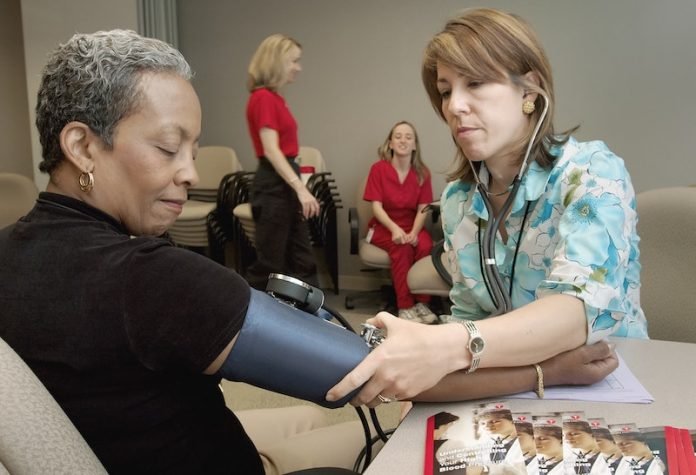
Many factors raise your risk of high blood pressure.
Some risk factors, such as unhealthy lifestyle habits, can be changed.
Other risk factors, such as age, family history and genetics, race and ethnicity, and sex, cannot be changed. A healthy lifestyle can lower your risk for developing high blood pressure.
Age
Blood pressure tends to increase with age. Our blood vessels naturally thicken and stiffen over time. These changes increase the risk for high blood pressure.
However, the risk of high blood pressure is increasing for children and teens, possibly because more children and teens are living with overweight or obesity.
Family history and genetics
High blood pressure often runs in families. Much of what we know about high blood pressure has come from genetic studies. Many different genes are linked to a small increase in the risk high blood pressure.
Research suggests that some DNA changes as an unborn baby grows in the womb may lead to high blood pressure later in life.
Some people have a high sensitivity to salt in their diet, which can play a role in high blood pressure. This can also run in families.
Lifestyle habits
Lifestyle habits can increase the risk of high blood pressure, including if you:
- Eat unhealthy foods often. This is especially true for foods with too much sodium and not enough potassium. Some people, including African Americans, older adults, and people who have chronic kidney disease, diabetes, or metabolic syndrome, are more sensitive to salt in their diet.
- Drink too much alcohol or caffeine.
- Don’t get enough physical activity.
- Smoke or use illegal drugs such as cocaine, “bath salts,” and methamphetamine.
- Don’t get enough good-quality sleep.
Medicines
Some prescription and over-the-counter medicines can make it more difficult for your body to control your blood pressure.
Antidepressants, decongestants (medicines to relieve a stuffy nose), hormonal birth control pills, and non-steroidal anti-inflammatory drugs (NSAIDs) such as aspirin or ibuprofen can all raise your blood pressure.
Other medical conditions
Other medical conditions change the way your body controls fluids, sodium, and Hormone in your blood. Other conditions that can cause high blood pressure include:
Certain tumors. Chronic kidney disease. Metabolic syndrome. Overweight and obesity. Sleep apnea. Thyroid problems.
Race or ethnicity
High blood pressure is more common in African American and Hispanic adults than in white or Asian adults.
Compared with other racial or ethnic groups, African Americans tend to have higher average blood pressure numbers and get high blood pressure earlier in life.
Sex
Men are more likely than women to develop high blood pressure throughout middle age. But in older adults, women are more likely than men to develop high blood pressure.
Women who have high blood pressure during pregnancy are more likely to have high blood pressure later in life.
Social and economic factors
Research now shows that factors such as income, your education, where you live, and the type of job you have may contribute to your risk of high blood pressure. Working early or late shifts is one example of a social factor that can raise your risk.
Additionally, some research has shown that experiencing danger, harm, or trauma as a child has links to a higher risk of developing high blood pressure.
Sign up for our newsletter for more information about this topic.
If you care about blood pressure, please read studies that common painkiller can harm your blood pressure, and common high blood pressure drugs may actually raise blood pressure.
For more information about blood pressure control, please see recent studies about teas that may help reduce high blood pressure, and results showing this recommended high blood pressure drug may have dangerous side effects.
Source: NHLBI



